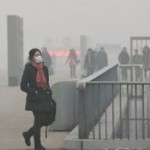 Geneva – World Health Organization (WHO) recommendations, released on November 12, highlight the dangers of burning fuels like unprocessed coal and kerosene in the home, and set targets for reducing emissions of health-damaging pollutants from domestic cookstoves, space heaters and fuel-based lamps.
Geneva – World Health Organization (WHO) recommendations, released on November 12, highlight the dangers of burning fuels like unprocessed coal and kerosene in the home, and set targets for reducing emissions of health-damaging pollutants from domestic cookstoves, space heaters and fuel-based lamps.
“WHO Guidelines for Indoor Air Quality: Household Fuel Combustion”, stress the need to improve access to cleaner home energy sources such as liquefied petroleum gas, biogas, natural gas and ethanol, or electricity, particularly in low- and middle-income countries.
These new guidelines come after WHO findings earlier this year revealed that more than 7 million deaths – one in eight of total global deaths – are due to indoor or outdoor air pollution exposure. According to the estimates, some 4.3 million people worldwide die every year from household air pollution emitted by rudimentary biomass and coal cookstoves.
“Ensuring cleaner air in and around the home is fundamental to reducing the burden of disease from air pollution, especially in low- and middle-income countries,” says Dr. Maria Neira, WHO Director for Public Health, Environmental and Social Determinants of Health. “The new WHO guidelines aim to help countries introduce cleaner technologies, improve air quality in poor households, reduce pollution-related diseases and save lives.”
Nearly 3 billion people worldwide still lack access to clean fuels and technologies for cooking, heating and lighting. Millions of people die each year as a result of household air pollution; 34% are due to stroke, 26% to ischaemic heart disease, 22% to chronic obstructive pulmonary disease, 12% to childhood pneumonia, and 6% to lung cancer.
These diseases are primarily caused by high levels of fine particulate matter and carbon monoxide released by the burning of solid fuels such as wood, coal, animal dung, crop waste and charcoal in inefficient stoves, space heaters, or lamps.
New Emissions Targets
The guidelines include emissions targets for different kinds of domestic appliances, for both carbon monoxide and fine particulate matter. The targets are the result of years of review of the health impacts of household air pollution emissions and careful examination of the levels by which emissions would have to be reduced in order to meet WHO guidelines for air quality.
“If the new emission targets are met, then some 90% of homes globally will meet WHO’s air quality standards,” said Dr. Neira.
Avoid Unprocessed Coal and Kerosene
The new guidelines recommend halting the use of unprocessed coal as a household fuel. Coal contains toxic elements such as arsenic, lead and mercury. The incomplete combustion of coal in inefficient stoves and space heaters can lead to severe illness and premature death.
The use of kerosene as a household fuel is also discouraged amid concerns around its adverse impact on air quality and safety. Kerosene is also associated with burns, fires and poisoning.
Health Consequences
In homes with open-burning and unvented coal or biomass stoves, emissions of particulate matter and other pollutants can be 100 times higher than WHO-recommended levels. Such pollutants are carcinogenic and cause heart and lung disease through impairing immune response, reducing the oxygen-carrying capacity of the blood, causing systemic inflammation and ischemia, among other physiological disturbances.
“Women and young children, who spend the most time near the domestic hearth, are particularly vulnerable,” says Dr. Flavia Bustreo, WHO Assistant Director General, Family, Women’s and Children’s Health cluster. “Globally, more than 50% of pneumonia deaths among children under 5 are linked to household air pollution.”
Women and children may also suffer other consequences. In many regions, they spend hours every day gathering fuel for traditional stoves, restricting time for earning money and going to school.
The Way Forward
“In order to meet the new targets, there needs to be rapid scale-up in access to cleaner and more modern cooking and heating appliances, as well as lamps, in developing country homes,” says Dr. Carlos Dora, WHO Coordinator for Public Health, Environmental and Social Determinants of Health.
“We need to scale up the use of clean fuels such as biogas, ethanol, or natural or liquefied petroleum gas with appropriate venting, as well as solar electricity solutions for lighting,” he said. “And clean technologies and fuels should be priced within reach of the lowest-income households.”














